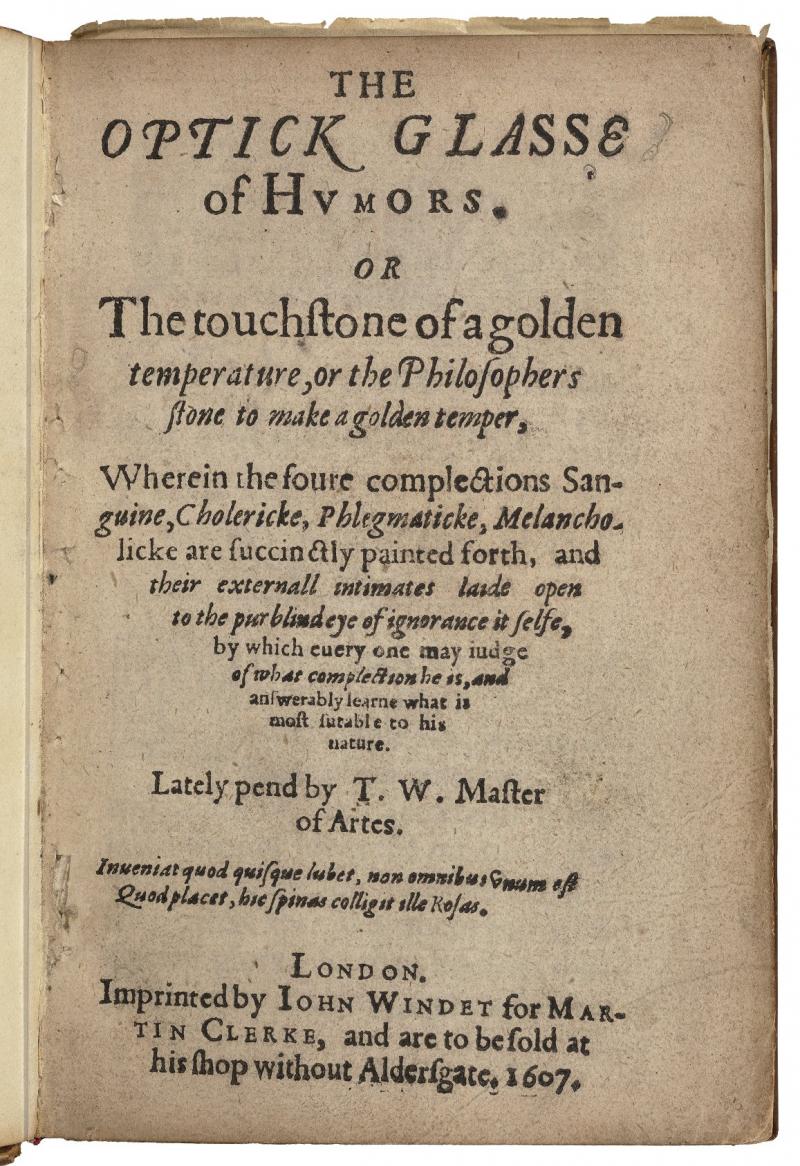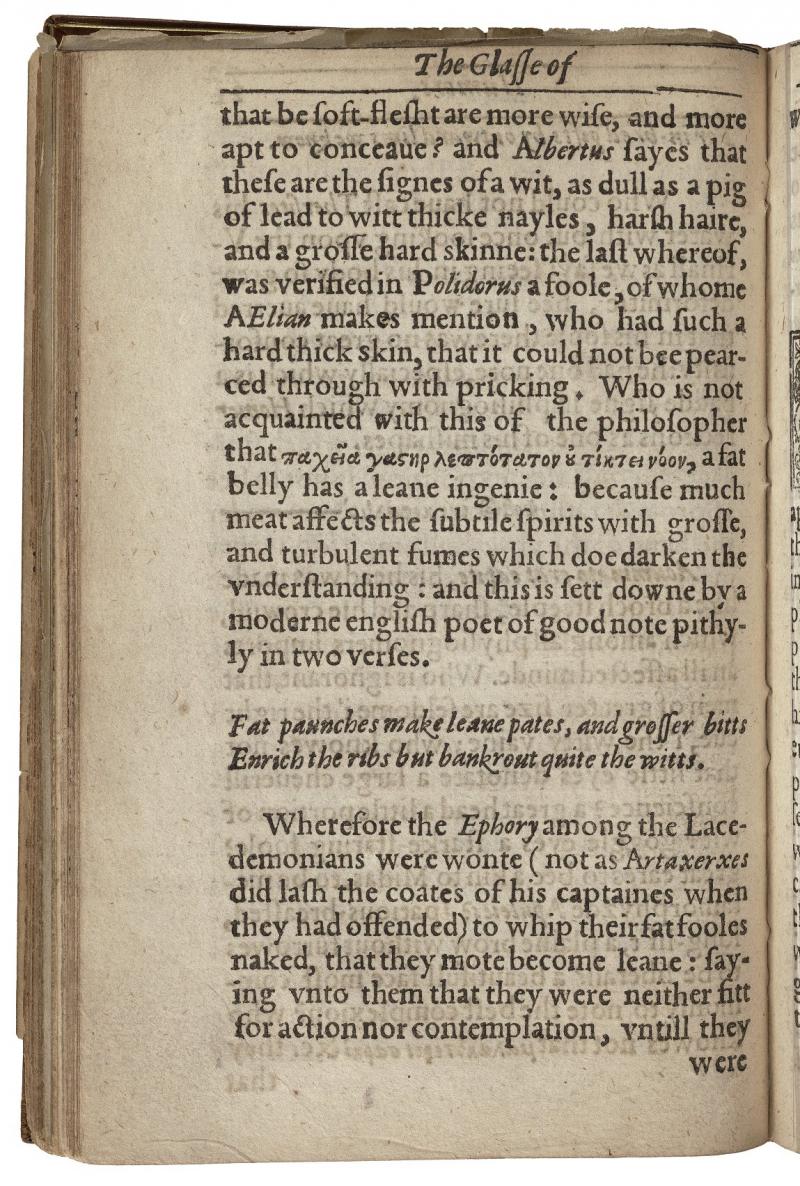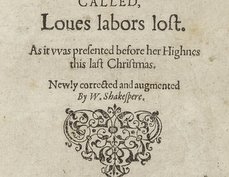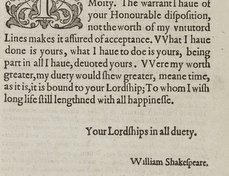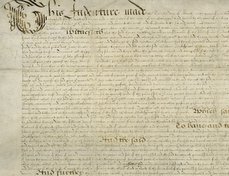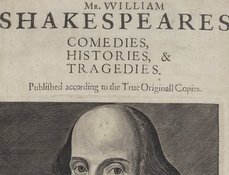Terms of use
Images that are under Folger copyright are licensed under a Creative Commons Attribution-ShareAlike 4.0 International License. This allows you to use our images without additional permission provided that you cite the Folger Shakespeare Library as the source and you license anything you create using the images under the same or equivalent license. For more information, including permissions beyond the scope of this license, see Permissions. The Folger waives permission fees for non-commercial publication by registered non-profits, including university presses, regardless of the license they use. For images copyrighted by an entity other than the Folger, please contact the copyright holder for permission information.
Copy-specific information
Creator: Thomas Walkington
Title: The optick glasse of humors. Or The touchstone of a golden temperature, or the Philosophers stone to make a golden temper, wherein the foure complections sanguine, cholericke, phlegmaticke, melancholicke are succinctly painted forth, and their externall intimates laide open to the purblind eye of ignorance it selfe, by which euery one may iudge of what complection he is, and answerably learne what is most sutable to his nature. Lately pend by T.W. Master of Artes.
Date: London : Imprinted by Iohn Windet for Martin Clerke, and are to be sold at his shop without Aldersgate, 1607.
Repository: Folger Shakespeare Library, Washington, DC, USA
Call number and opening: STC 24967, title page & sig. D5v
View online bibliographic record
Laura Estill, "Love's Labor's Lost excerpted: The optick glasse of humors," Shakespeare Documented, https://doi.org/10.37078/686.
Folger Shakespeare Library, STC 24967. See Shakespeare Documented, https://doi.org/10.37078/686.
Thomas Walkington’s The Optick Glasse of Humors (1607) popularized one of Shakespeare’s most-quoted lines in the seventeenth century: “Fat paunches have lean pates, and dainty bits / Make rich the ribs but bankrupt quite the wits,” from Love’s Labor’s Lost (1.1.27-28). In the play, Longaville says this to praise his upcoming fast: he suggests that a fat belly indicates a small brain and that eating too much makes people think more slowly.
Walkington’s book about the four humors, the elements that were thought to govern a person’s body and temperament in Shakespeare’s day, was republished multiple times (1631?, 1639, and twice in 1664). Walkington quotes Shakespeare as an example of physiognomy, the pseudo-scientific belief that physical attributes describe personality. He introduces the quotation with a paraphrase: “much meat affects the subtile spirits with grosse, and turbulent fumes which doe darken the vnderstanding” and a nod to Shakespeare’s authorship, “and this is sett downe by a moderne english poet of good note pithyly in two verses” (sig. D5v).
Versions of Shakespeare’s couplet circulated both in print and handwritten documents over the course of the seventeenth century. “Fat paunches” also appears in Robert Allott’s Englands Parnassus (1600); Christopher Newstead’s An Apology for Women (1620); A Helpe to Discourse (1623 and later editions); John Clarke’s Paroemiologia Anglo-Latina (1639 and reprints); John Norton’s The Scholar’s Vade Mecum (1675); Richard Head’s Proteus Redivivus (1675); Poor Robin’s Almanack (1697), and manuscripts at the Bodleian and British Library (Bodleian MS Rawl. poet. 117; Bodleian MS Rawl. D. 954; BL Add. MS 18044). Two reference books, John Ray’s A Collection of English Proverbs (1670) and William Robertson’s Phraseologia Generalis (1681), include only the first line of Shakespeare’s couplet. We know that Shakespeare’s couplet was copied from The Optick Glasse and not from early print sources of Love’s Labour’s Lost because Walkington changed the wording to “Fat paunches make lean pates, and grosser bits / enrich the ribs” (altered words indicated with italics): it is this wording that is found in most later sources that use Shakespeare’s couplet.
Shakespeare borrowed the notion of “fat paunches hav[ing] lean pates” from a Greek proverb by St. Jerome. Walkington, in turn, quoted Shakespeare’s couplet from Love’s Labor’s Lost—and from Walkington’s text, these lines were recopied multiple times, sometimes with and sometimes without reference to the Bard, whom Walkington describes as a “moderne english poet of good note.”
Written by Laura Estill
Sources consulted
Laura Estill, Dramatic Extracts in Seventeenth-Century English Manuscripts: Watching, Reading, Changing Plays. (Newark, DE: University of Delaware Press, 2015).
William Shakespeare, Love's Labors Lost. The Folger Shakespeare. Ed. Barbara Mowat, Paul Werstine, Michael Poston, and Rebecca Niles. Folger Shakespeare Library. https://shakespeare.folger.edu/shakespeares-works/loves-labors-lost
Last updated June 8, 2020

